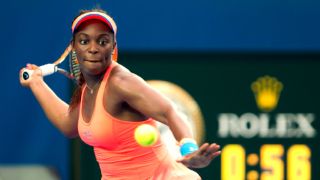|

A YEAR AGO, the "It" hype machine was anointing its newest member while it was coldly reassessing its most recent inductee. Sloane Stephens, the best hope for U.S. tennis since the Williams sisters burst onto the scene, was basking in the afterglow of beating an injured Serena in the Australian Open quarterfinals. Stephens lost her semifinal match to Victoria Azarenka, but the hype machine had already been ignited. Her wonderful face, all brightness, innocence and shock and hope, had lit up flat-screens around the country. She created one moment, and these days, that's all it takes. She was next. Simultaneously, the hype machine was on pause for Robert Griffin III, because he had torn his knee to pieces guiding his team to the playoffs. And so RG3's camp decided to co-opt the narrative, reshape it. The story was no longer focused on the field, because he was on crutches, but Griffin's people made sure the legend continued -- in the weight room, on the comeback trail. Today paints a much more sober picture of both athletes. After a Sputnik-like ascent, Griffin is crestfallen, no longer wise beyond his years but suddenly very much the inexperienced young man he always was, with much to learn about life and leadership. He is now, after the phenomenon, all too human. His fall was hastened by injury and poor play and an intense scrutiny of sentences that in victory resembled leadership but in defeat something far less attractive. While Griffin fended off criticism last season, two other young quarterbacks, Colin Kaepernick and Russell Wilson, ran right past him. Kaepernick reached the Super Bowl in 2013; Wilson won it this year. Not only is it doubtful that Griffin is a top-10 quarterback in the NFL, it is unclear whether he is even the best quarterback on his own team. As for Stephens, she did not Sputnik after beating Serena; she never got off the ground. The hype machine enjoyed a short Williams-Stephens Twitter spat, but the throne-abdication plotline turned out to be nothing more than words and pictures. Stephens hasn't challenged Williams. She hasn't yet won a WTA tournament. She hasn't even reached a final. In the 22 tournaments she has played since beating Williams in Australia, Stephens has been eliminated in the first or second round nine times. For now, her struggles have been massaged into a different narrative -- that Stephens is a "big tournament" player who raises her game for grand slams. This idea is a compliment to the enormity of Stephens' talent, but if she realized early in her career that she had the ability to be a top-20 player for the next 10 years, she is also discovering that her game is nowhere near good enough to make her a transcendent, elite player. Stephens is finding that talent is not enough. And much like with Griffin, Stephens is watching as other less hyped players such as Eugenie Bouchard and Simona Halep produce better results. Some perspective is required here. Griffin is 24. Stephens turns 21 in March. Their journeys, despite the Adidas and Under Armour ad campaigns, magazine covers (including ours), pseudo-documentaries and ill-advised talk of "legacies," are just beginning. But the problem is that, compared to 20 years ago, today's sports cacophony makes it easier to be swallowed whole by the noise while losing sight of the performance. Griffin and Stephens should serve as reminders of just how hard the games are, of how much harder it is to actually be great -- a goal made even more difficult by the desire on the part of the public, the media and the entourage to anoint. Both have been reminded that being declared "It" is at best a cruel trap; it's to be treated like a legend without actually being one, then to be rebuked severely when expectations are not met. But Griffin and Stephens can still learn. In a landscape of high compensation and attention for thin resumes, a premium exists on having a true anchor -- to resist the comparisons to 17-time grand slam winners, to dismiss the significance of NFL jersey sales, to remember and believe that being an athlete is far different from being a celebrity, and that doing the work is still the ultimate reward. Follow The Mag on Twitter (@ESPNmag) and like us on Facebook. . . . . . . . . . . . . . . . . . . . . . . . . .
|
